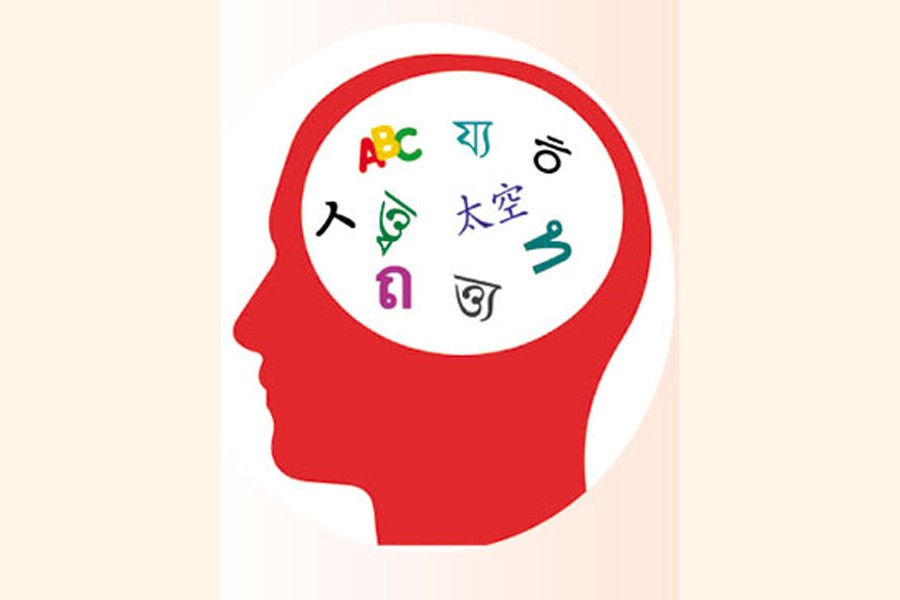
Published :
Updated :

 Languages are not just a collection of words, and associated sounds, rather they are intricate systems of codes that are woven into our very core. They allow us to express ourselves ornately, connect with others, and process our emotions. Languages are arguably one of the most molecular reflections of society. It is the development of complex verbal and written languages that have set humanity apart from the rest of the animal kingdom. Thus, it will not be an exaggeration to state languages are an integral aspect of our identity and they impact our thought process, mental makeup, and even personality.
Languages are not just a collection of words, and associated sounds, rather they are intricate systems of codes that are woven into our very core. They allow us to express ourselves ornately, connect with others, and process our emotions. Languages are arguably one of the most molecular reflections of society. It is the development of complex verbal and written languages that have set humanity apart from the rest of the animal kingdom. Thus, it will not be an exaggeration to state languages are an integral aspect of our identity and they impact our thought process, mental makeup, and even personality.
With increasing rates of globalisation, more of the world now identify as at least bilingual, or multilingual, rather than monolingual. In addition to Bangla, the major chunk of the population of Bangladesh can either speak Hindi owing to its close linguistic ties with Bangla, or English because of the region's colonial past or both. Some obvious gains come with having a command over two or more languages. For example, bilingual and multilingual people have wider access to the world's reserve of literature, music, etc. However, aside from the apparent benefits, what are the more profound implications of this trend? Does a bilingual or a multilingual brain function differently? Fortunately, a large number of studies conducted on this topic provide us with solid and intriguing answers.
The celebrated psycholinguist, Frank Smith has said it best, "One language sets you in a corridor for life. Two languages open every door along the way." From as early as infancy, bilingual children exhibit divergence from their monolingual peers. The bilingual brain performs better in terms of both cognitive and sensory processing. Infants exposed to a bilingual environment have been proven to possess an enhanced attention span. They are also better at conflict management.
A study conducted in 2010 revealed that bilingual children are more likely to exhibit a higher degree of creativity than monolingual children. Additionally, they demonstrate a comparatively heightened ability to master abstract concepts. Similarly, based on the findings from numerous other studies, it can be safely concluded that learning at least a second language in childhood modifies the composition of the developing brain for the better. These perks don't just end in childhood but continue to benefit us throughout our lives.
A study (2010) administered by psychologist Ellen Bialystok and her colleagues at York University in Toronto concluded bilingualism can successfully protect the brain against mental decline. They found, among other factors, such as cognitive ability and occupational demand being equal, bilingual test subjects were better shielded from different neurological diseases, such as dementia, Alzheimer's, etc. Notably, it appears that being fluent in more than two languages offers even greater protection. A study conducted in 2011 concluded that people who spoke at least three languages are only 25 per cent as likely to be mentally impaired compared to people who are versed in just two languages.
It is to be noted these benefits do not exclusively manifest in those who were exposed to bilingual or multangular environments in their childhoods. People who learnt a second language later in adulthood can also enjoy these perks.
In addition to these neurological and cognitive advantages, people who have command over two or more languages also possess certain obvious social advantages over their monolingual peers. For example, they can experience a foreign culture much more intimately and develop a stronger connection with native speakers. As such, they can enjoy a broader perspective and a deeper understanding of the world.
On the flip side, there are also some challenges that come with being bilingual. Some studies suggest that bilingual brains deal with persistent language clashes as when they use one language the other language is also simultaneously active in their brains. This can understandably translate to experiencing language difficulties. To navigate this, the bilingual brain employs executive functions, such as attention and inhibition. As a result, constant practice of controlling which language is to be used at what times strengthens the ability of a bilingual person to manage conflict, multi-tasking, and filter unnecessary information making them better at problem-solving.
Despite the slight drawbacks, it is undeniable that having a command over two or more languages is a quality everyone can benefit from in almost all aspects of their lives. Experts suggest the best way to be fluent in a second language is to start training as early as possible and practice constantly. The training process also needs to be systematic. It is recommended that learners be exposed to the second language every day for best results. This is easier to manage for children possessing a multilingual background. However, those coming from monolingual backgrounds may require additional training. "Some students come out fluent; others not as much. But the benefits are clear," commented psychologist Ellen Bialystok.
The writer is a fourth-year BBA student at the Institute of Business Administration (IBA),
University of Dhaka.
simitasnia@gmail.com


 For all latest news, follow The Financial Express Google News channel.
For all latest news, follow The Financial Express Google News channel.